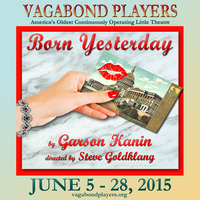Money talks. And in a city of few secrets and much chat it’s easy to see that Washington DC hasn’t changed in 70 years. The world can only be as good as the people in it, and the same goes for a play. Fortunately at the Vagabond Players, the talent thriving within the confines of Garson Kanin’s Born Yesterday is stellar, making the production a smashing success. Directed by Steve Goldklang, this preserved theatrical chestnut is revitalized with Baltimore locals bringing a refreshing verve and spirit to the tried tale of corruption in politics. Witty, edgy, and a mirror to DC as we know it, the performances contained within the production bring living caricatures a much needed facelift.
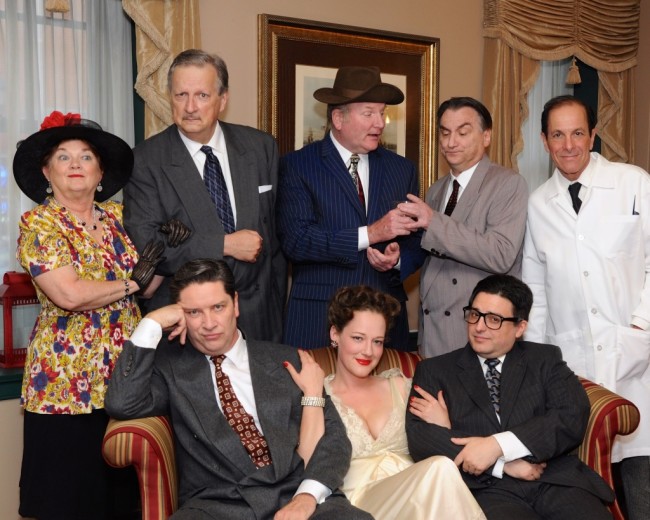
Scenic Designers Roy Steinman and Maurice “Moe” Conn set the atmospheric tone the moment the audience sees the set. It’s a swanky joint, as Harry Brock might say, with the gold-gilded trim and molding all around the suite. The marble tiling of the floor is a nice, albeit mismatched, touch juxtaposed against the dark floral patterned wallpaper. Steinman and Conn infuse the set with glorious decadence; an ironic reflection that the suite is reserved for a junk mogul and his crass but classy broad. There’s even a lavish crystal-drip chandelier strung up over the main room, completing the look of elegance that only sleazy money can buy.
Costume Coordinator Ann Mainolfi enhances the 1940’s atmosphere with her sharp eye for the era’s couture. A lost era— jammed somewhere between the stylish and swanky 20’s and the demure and chaste 50’s— the dapper suits and fitted garments do the cast of characters a sturdy justice in this production. Mainolfi’s fine work is best exhibited on the Billie Dawn character, each outfit designed to exude a level of sex appeal that runs parallel to her intelligence at that point in the show. Even in the checkerboard business suit, there is a hint of feminine sexuality that suits the character’s frame, though it pales by comparison to the initial look of the curve-hugging scarlet stunner that gives Billie Dawn a real class-act first entrance.
Director Steve Goldklang invigorates a racy momentum into the dated script, keeping the pacing of the scenes rumbling along without rushing them or allowing them to stagnate in their own verbosity. He takes the art of directing a step further by carefully crafting a balanced portrayal of silent responses into moments of few words, like the card scene between Harry and Billie. A volume of dialogue is exchanged between their facial expressions and Goldklang ensures that this is done tactfully and earnestly without pantomime or artifice. The scene is one of the most entertaining and also most natural in the performance.
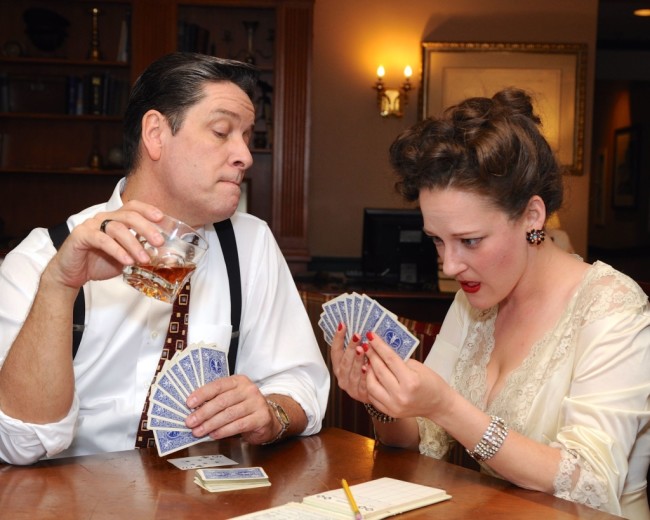
Cameo performances of note encompass just under half of the players in the performance. Senator Norval Hedges (Bill Bossemeyer) and his wife (played by Carol Conley Evans) are minor characters, though integral to the plot, but make the stage time memorable, particularly Evans’ portrayal. With animated facial expressions and hilarious physical responses to Harry Brock’s brutish nature, Evans provides a liberal and much needed dose of humor in those scenes. She also doubles as the suite maid, Helen, and gives an equally rousing performance in this role. It’s her unintentional arrival that causes drastically hysterical pauses between Billie and Harry’s arguments, furthering the comic relief Evans provides on the whole.
Bruce Levy is another mostly seen character, doubling as the Bellhop and the Barber. A quirky affected accent— and a rigorous costume change— delineates one from the other. Levy’s barber is a comic addition to a terse and tense scene early in the production. Mark Wible adds to the humor of the show with his constant crossing back and forth through the back of the stage. Playing the thick-witted Eddie Brock, brother to and in the employ of the tyrannical Harry, Wible adds laughs to the performance simply by appearing in a scene from time to time. It’s the nuances of these little moments that flesh the play out to its fullest potential.
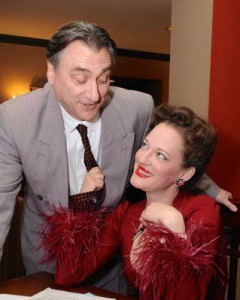
Mark Scharf, as the closeted drunk lawyer Ed Devery, falls right between the cameo cutthroats and the principle performers. His portrayal of Devery is mild but poignant, a balanced deliver to temper the comic shenanigans of the cameo crew against the meatier depth of the principles. There is a meticulous calm to Scharf’s performance that escalates only when absolutely necessary into something uglier than his well-maintained demeanor. Scharf’s approach to the character’s alcoholism is subtle; a sneaking underhanded ladle of drunkenness that diffuses its way into the character’s physicality in a surreptitious and almost charming manner.
Nerdy journalist by day and women’s rights activist Casanova by nightfall, Paul Verrall (Torberg M. Tonnessen) finds himself in quite the predicament when it comes to the happenings of Suite 67D. Tonnessen, by comparison to the more bombastic and extroverted characters in the play, seems boring at first, but his performance is given in earnest. Finding the equilibrium of the character’s charm and attraction when it comes to Billie is a challenge that Tonnessen meets with aplomb. There’s even a hint of cheeky flippancy when it comes to the progressive interactions he shares with Harry Brock; a façade of friendship that falls away as the show carries onward to the conclusion.
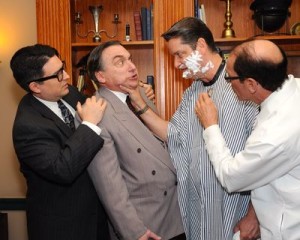
What’s it going to be for actor Steven Shriner, a plug? Or a pan? Playing the notoriously hot-headed Harry Brock, Shriner can sling with the best of them. With a Jersey-New York City by way of Cleveland accent, Shriner fits the bill for a bad mobster from a great 40’s film. His handsome appearance is readily sullied by the multitudinous grit and truculent arrogance he imbues into his character portrayal. But there’s more to Shriner’s performance than just bombastic blasts of his big bad-boy mouth. The assertive nature with which he approaches the text is the epitome of a 1940’s slick-mouthed, fast-talking, street man. Creating dynamic levels within the roughneck mug character, Shriner delivers an easily despicable character that boils the blood and revolts the stomach, particularly with his treatment of and interactions with Billie Dawn.
Anne Shoemaker, in the role of a lifetime, holds her own against Shriner’s caustic and volatile nature. The scenes between them are compelling and loaded with vigor. The card playing scene is a perfect moment of carefully concocted facial responses from Shriner with seemingly innocent, but deeply intentional, gestures and articulate body language from Shoemaker. She carries her character with a proud poise throughout the performance, but even more so when she defies him with a long-standing pause or withering look. The pair have a perfectly disgusting chemistry between them, driving the show’s main plot point home.
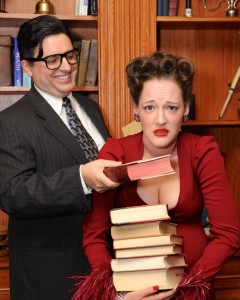
Shoemaker gives a sensational performance in the role of Billie Dawn. Her outfits suit the deliberately crafted persona that makes her look like a step out of time; an honest Marlene Dietrich as it were. From her pinched Broadway doll accent to her sassy attitude that masks the character’s stupidity, Shoemaker is on fire from the moment she slinks into the suite to the moment she sashays out of it near the end of the play. A loaded pistol that packs plenty of punches in her own determined and feisty fashion, Shoemaker really spins the character of Harry Brock around on his ear once or twice through. The emotional roller coaster of the character’s journey is not foregone in Shoemaker’s performance either, if anything she invites the audience to fully experience the character’s many vibrant feelings at every opportunity she gets. A remarkable performance that really makes the play pop, Shoemaker delivers exceptional talent that motivates her protagonist character, and by proxy, the show’s general momentum.
Running Time: 2 hours and 20 minutes with one intermission
Born Yesterday plays through June 28, 2015 at The Vagabond Players— 806 S. Broadway in the heart of Fells Point in Baltimore, MD. For tickets call the box office at (410) 563-9135 or purchase them online.

